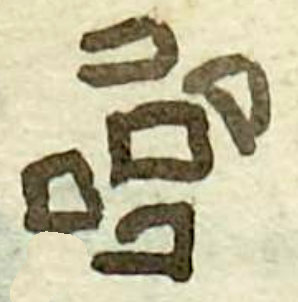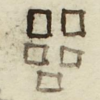Xiuhtli (MH619v)
This black-line drawing of the simplex glyph for the personal name Xiuhtli ("Comet" or someone born at the end of a 52-year cycle) shows a cluster of four small rectangles and a triangle--seemingly meant to suggest tesserae--turquoise (xihuitl) pieces used in mosaics.
Stephanie Wood
This popular name, Xiuhtli, is linked to the religious calendar of years, because it was a name given to boys born during the time of the binding ceremony at the end of every fifty-two year cycle. When it relates to the ending of a 52-year cycle, the name Xiuhtli could contain the Xiuh- that is the stem for xihuitl (year). Turquoise (xihuitl, only distinguishable from the word for year when in context) is also a near homophone for comet (xiuhtli), which makes this a phonogram. Apparently, the turquoise mosaic pieces, the artist/writer hoped, would bring to mind the name Xiuhtli. There are other names in this collection that similarly use the turquoise pieces, such as Xiuhnel, the name of the morning star and a cloud serpent in the Nahua religion.
1560
Jeff Haskett-Wood
turquesa, mosáicos, piezas, tesserae, cometas, comets, xiuhpohualli, año, turquesa, xihuitl, nombres de hombres

xiuh(tli), a comet and a name for a boy born at the end of a 52-year cycle, https://nahuatl.wired-humanities.org/content/xiuhtli
xihui(tl), turquoise, https://nahuatl.wired-humanities.org/content/xihuitl-0
El Cometa
Stephanie Wood
Matrícula de Huexotzinco, folio 619v, World Digital Library, https://www.loc.gov/resource/gdcwdl.wdl_15282/?sp=321st=image.
This manuscript is hosted by the Library of Congress and the World Digital Library; used here with the Creative Commons, “Attribution-NonCommercial-ShareAlike 3.0 License” (CC-BY-NC-SAq 3.0).








